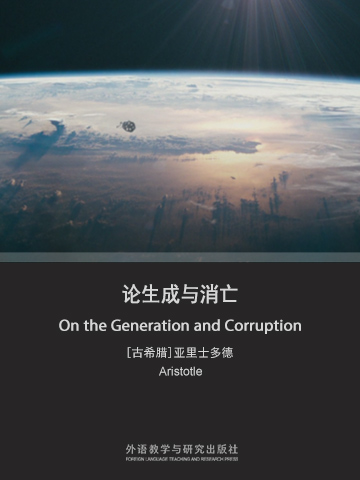世间万物自何处来?朴素唯物主义为您解答。
On Generation and Corruption (Latin: De Generatione et Corruptione), also known as On Coming to Be and Passing Away) is a treatise by Aristotle. Like many of his texts, it is both scientific and philosophic (although not necessarily scientific in the modern sense). The philosophy, though, is essentially empirical; as in all Aristotle's works, the deductions made about the unexperienced and unobservable are based on observations and real experiences.
The question raised at the beginning of the text builds on an idea from Aristotle's earlier work The Physics. Namely, whether things come into being through causes, through some prime material, or whether everything is generated purely through "alteration."
Alteration concerned itself with the ability for elements to change based on common and uncommon qualities.
From this important work Aristotle gives us two of his most remembered contributions. First, the Four Causes and also the Four Elements (earth, wind, fire and water). He uses these four elements to provide an explanation for the theories of other Greeks concerning atoms, an idea Aristotle considered absurd.
亚里士多德在他的论文集《论生成与消亡》中提出天体和地球是由不同的材料组成的。月层以下的一切物体都是由土、火、水、气四种元素组成,而这四种元素还不是“最终基质”,更基本的是四种不同的性质——冷、热、干、湿,它们两两结合而形成了这四种元素。最终,四大元素的不同组合就形成了世间万物。
On Generation and Corruption (Latin: De Generatione et Corruptione), also known as On Coming to Be and Passing Away) is a treatise by Aristotle. Like many of his texts, it is both scientific and philosophic (although not necessarily scientific in the modern sense). The philosophy, though, is essentially empirical; as in all Aristotle's works, the deductions made about the unexperienced and unobservable are based on observations and real experiences.
The question raised at the beginning of the text builds on an idea from Aristotle's earlier work The Physics. Namely, whether things come into being through causes, through some prime material, or whether everything is generated purely through "alteration."
Alteration concerned itself with the ability for elements to change based on common and uncommon qualities.
From this important work Aristotle gives us two of his most remembered contributions. First, the Four Causes and also the Four Elements (earth, wind, fire and water). He uses these four elements to provide an explanation for the theories of other Greeks concerning atoms, an idea Aristotle considered absurd.
- Book I
- Book II
- 书评 写书评
- 笔记
-
书评加载中...






















 京公网安备 11010802032529号
京公网安备 11010802032529号
笔记加载中...